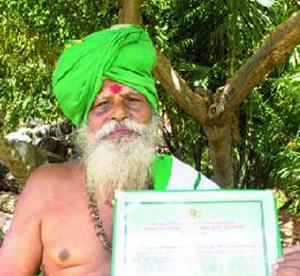
Coimbatore :
Sporting just a sandal-coloured veshti and a green shawl thrown over the shoulder, a man with a long and thick grey beard and upper torso bared could not be missed in the queue of students waiting to collect their bachelors’ degree in farm technology. The minute he walked out of the auditorium of Tamil Nadu Agricultural University (TNAU) on Wednesday morning many professors and students, who addressed him as ‘swami’, walked up to the man to congratulate him.
85-year-old Anbu Sundaranandi Swamigal, from Jaisakthi Viraja Gurukulam in Vinayagar Valagam in Tirupur, was one of the 165 students who passed the three-year BFTech course offered by TNAU through distance learning. His presence made many curious onlookers wondering what a man resembling and sounding like a ‘godman’ was doing among the new graduates.
“Well I am someone who decided to dedicate the later part of my life to service and yes I do yoga and am a siddha and naturopathy medical practitioner,” he said. “But my main focus was on serving the people by saving the profession of farming and bringing about organic farming,” he said. “I believe in worshipping the five elements — earth, air, water, wind and fire. But mother earth has been spoilt by all these chemical fertilisers.”
The octogenarian, who worked as a textile technician for 38 years, began learning more about organic farming by meeting and following Indian organic farming scientist G Nammalvar since 1995. “I slowly began going on tours to many districts like Thiruvannamalai and Dindigul and would advise farmers to opt for organic farming,” he said.
Swamigal says he joined the course to obtain scientific knowledge about organic farming and how better they can use natural resources. “This way when I go on tours across the state and country to meet farmers, I can scientifically explain the procedures, their positives and their negatives,” he said.
Swamigal also started offering free consultancy service every Sunday since last month. “It is open to farmers or people who want to get into organic farming and want advice on how to go about it. I also invite buyers so they can meet farmers and procure goods directly,” he said. “I personally have now put papaya in my 1.5 acre land.”
Like Sundaranandi Swamigal, there were many farmers or people who want to get into farming consultancy who decided to get into a classroom at the university for two days every month for three years. “While 35 per cent to 40 per cent of our class consisted of pure farmers who decided to take the course to scientifically understand and improve what they were doing, 50 per cent came from varied professions such as marketing, tax officials and auditors and the remaining 10 per cent came from allied professions within agriculture like seed marketing,” says G Vivek, 38, a graduate.
Vivek, who holds a diploma in electrical and electronic engineering, a master’s degree in social work, and more than 10 years work experience in marketing, decided to take this course for his love of farming and dream of making farming as lucrative as medicine or engineering. “I was always interested in farming. I dreamt of creating collective or integrated farming, so when any crop was produced in large-scale, selling, marketing and even labour sharing would be easier,” he said.
“I, however, knew that I had to study more about it, make more contacts among experts and researchers in the field. I also wanted this degree to have scientific knowledge and backing of the suggestions I give farmers so that they trust me,” he says. “It also helps when we approach banks for loans and government officials for schemes and subsidies,” he adds.
A few students had simply taken the course for the love of knowledge like retired income tax department official Dr K Singharavelu who has obtained eight degrees and a doctorate so far.
source: http://www.timesofindia.indiatimes.com / The Times of India / Home> City> Coimbatore / by Pratiksha RamKumar, TNN / July 04th, 2015